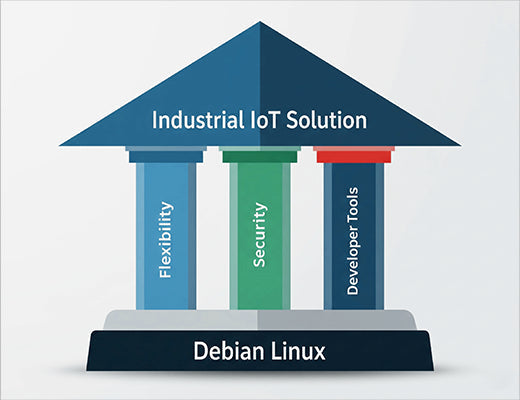
Why Choose a Debian Based LoRaWAN Gateway for IoT Flexibility
|
|
Time to read 4 min
|
|
Time to read 4 min
When selecting a LoRaWAN gateway, the hardware specs are important, but the operating system is the soul of the machine. It dictates your freedom to innovate.
This guide explores the powerful advantages of choosing a Debian Based LoRaWAN Gateway . We'll explain why this open-source foundation, combined with industrial-grade hardening, provides a level of flexibility, developer-friendliness, and future-proofing that closed, proprietary systems simply can't match.
Learn how you can leverage tools like Docker and a massive software ecosystem to build truly custom IoT solutions.
I've seen many IoT projects hit a wall, not because the hardware was bad, but because the gateway's operating system was a locked-down, proprietary black box. The vendor didn't support a specific protocol they needed, or they couldn't install a simple script to process data locally. Their project was held hostage by the manufacturer's development roadmap.
This is why the choice of OS is so critical. An open system empowers you; a closed one restricts you. A Debian Based LoRaWAN Gateway is built on the philosophy of empowerment. It gives you the keys to the kingdom, allowing you to install what you want, run what you need, and build a solution that perfectly fits your unique requirements, not the other way around.

apt command. Need a Python library for data analysis, a specific database client, or an advanced networking tool? It's likely just one command away, saving you countless hours of manual compilation.Let's be clear: you can't just install a standard Debian image on a board and call it an industrial gateway. A true Debian Based LoRaWAN Gateway uses a hardened, commercially supported version of the OS.
A platform like the Robustel R1520LG runs RobustOS Pro , which takes the open, flexible core of Debian and adds critical industrial-grade layers on top:
Here’s what truly unlocks the potential of a Debian Based LoRaWAN Gateway : native support for Docker . Docker is a containerization platform that lets you package your application and all its dependencies into a single, portable unit.
What does this mean for you?
Simplified Updates: Updating your application is as simple as deploying a new container image, a process that can be automated across your entire fleet with a cloud platform like RCMS.
Choosing your gateway's operating system is a long-term strategic decision. While a proprietary OS might seem simpler at first, it often leads to frustrating limitations down the road. A Debian Based LoRaWAN Gateway offers the best of both worlds: the rock-solid stability and massive ecosystem of open-source Linux, combined with the security and reliability features required for mission-critical industrial deployments. It’s a platform that empowers you to innovate, adapt, and build the exact solution your project demands.

A1: A standard Debian installation is not, but a hardened, commercially supported version like RobustOS Pro is. It adds critical security layers, undergoes third-party penetration testing, and is developed under a certified secure lifecycle, making it ideal for industrial environments.
A2: Yes, absolutely. Your knowledge of the command line, scripting, and package management (apt) is directly transferable, which dramatically reduces the learning curve and accelerates development time.
A3: Docker provides isolation, portability, and consistency. It prevents different applications from having conflicting library requirements and ensures your application runs the same way everywhere, from your development machine to thousands of devices in the field.